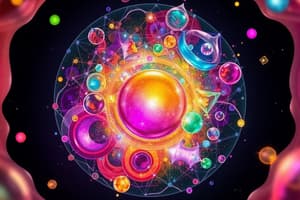Podcast
Questions and Answers
What is the main characteristic of impurities in a mixture?
What is the main characteristic of impurities in a mixture?
- They enhance the quality of the mixture
- They change the chemical composition of the mixture
- They affect the properties of the mixture (correct)
- They are present in large amounts
Which of the following is a compound?
Which of the following is a compound?
- Hydrogen
- Iron
- Oxygen
- Sugar (correct)
What are elements considered as?
What are elements considered as?
- Compounds
- Mixtures
- Pure substances (correct)
- Impurities
How do compounds differ from their constituent elements?
How do compounds differ from their constituent elements?
What effect can impurities have on the production of sugar?
What effect can impurities have on the production of sugar?
What role do compounds play in determining the purity of matter?
What role do compounds play in determining the purity of matter?
What is the main difference between homogeneous and heterogeneous mixtures?
What is the main difference between homogeneous and heterogeneous mixtures?
Which separating technique involves heating a liquid mixture to produce a vapor and then condensing it back into a liquid?
Which separating technique involves heating a liquid mixture to produce a vapor and then condensing it back into a liquid?
What is the essential concept in chemistry that helps us distinguish between pure substances and mixtures?
What is the essential concept in chemistry that helps us distinguish between pure substances and mixtures?
What is chromatography used to separate mixtures based on?
What is chromatography used to separate mixtures based on?
What is the main characteristic of a homogeneous mixture?
What is the main characteristic of a homogeneous mixture?
Which type of mixture does a cup of sugar in water represent?
Which type of mixture does a cup of sugar in water represent?
What is a compound?
What is a compound?
Which separating technique is used for separating homogeneous mixtures?
Which separating technique is used for separating homogeneous mixtures?
What is the main characteristic of suspensions?
What is the main characteristic of suspensions?
What is the fundamental difference between compounds and their constituent elements?
What is the fundamental difference between compounds and their constituent elements?
How do impurities affect the quality and performance of a material?
How do impurities affect the quality and performance of a material?
What are elements classified into, based on their properties?
What are elements classified into, based on their properties?
What is the role of hydrogen and oxygen in forming water (H2O)?
What is the role of hydrogen and oxygen in forming water (H2O)?
What is the most appropriate classification for mixtures or compounds with impurities?
What is the most appropriate classification for mixtures or compounds with impurities?
Study Notes
Is Matter Around Us Pure?
Matter is all around us, and it is essential to understand the nature of the substances that constitute our surroundings. The purity of matter is an essential concept in chemistry, as it helps us distinguish between pure substances and mixtures. In this article, we will discuss mixtures, separating techniques, impurities, elements, and compounds, and how they relate to the purity of matter.
Mixtures
A mixture is a combination of two or more substances that are physically combined but not chemically bonded. Mixtures can be classified into two categories: homogeneous and heterogeneous. Homogeneous mixtures are uniform throughout, meaning that the composition of the mixture is the same in every part. Heterogeneous mixtures, on the other hand, have a non-uniform composition, with different parts containing different proportions of the substances.
Separating Techniques
Separating techniques are used to separate mixtures into their constituent substances. These techniques include filtration, distillation, and chromatography. Filtration is a process in which solid particles are separated from a liquid mixture. Distillation involves heating a liquid mixture to produce a vapor, which is then condensed back into a liquid, allowing for the separation of substances based on their boiling points. Chromatography is a technique used to separate mixtures based on the differences in the rates of migration of the components through a medium.
Impurities
Impurities are substances that are present in a mixture in trace amounts and can affect the properties of the mixture. Impurities can be inorganic or organic substances, and their presence can affect the color, taste, odor, and other properties of the mixture. For example, in the production of sugar, impurities such as sulfur dioxide, chlorine, and iodine can negatively impact the quality of the product.
Elements
An element is a pure substance that cannot be broken down into simpler substances by chemical reactions. Elements are the building blocks of all matter, and there are over 100 naturally occurring elements on Earth. Examples of elements include hydrogen, oxygen, nitrogen, carbon, and iron.
Compounds
A compound is a pure substance consisting of two or more elements chemically bonded together. Compounds have unique properties that are different from their constituent elements. For example, water is a compound made up of hydrogen and oxygen, and it has properties such as boiling at 100 degrees Celsius and freezing at 0 degrees Celsius, which are different from those of its constituent elements.
In conclusion, the purity of matter is an essential concept in chemistry, as it helps us understand the nature of the substances that make up our surroundings. Mixtures, separating techniques, impurities, elements, and compounds all play a role in determining the purity of matter. By understanding these concepts, we can gain a deeper appreciation for the complex and fascinating world of chemistry.
Studying That Suits You
Use AI to generate personalized quizzes and flashcards to suit your learning preferences.
Description
Test your knowledge about mixtures, separating techniques, impurities, elements, and compounds, and how they relate to the purity of matter in chemistry. Explore the concepts of homogeneous and heterogeneous mixtures, techniques like filtration, distillation, and chromatography, the impact of impurities, and the properties of elements and compounds.




